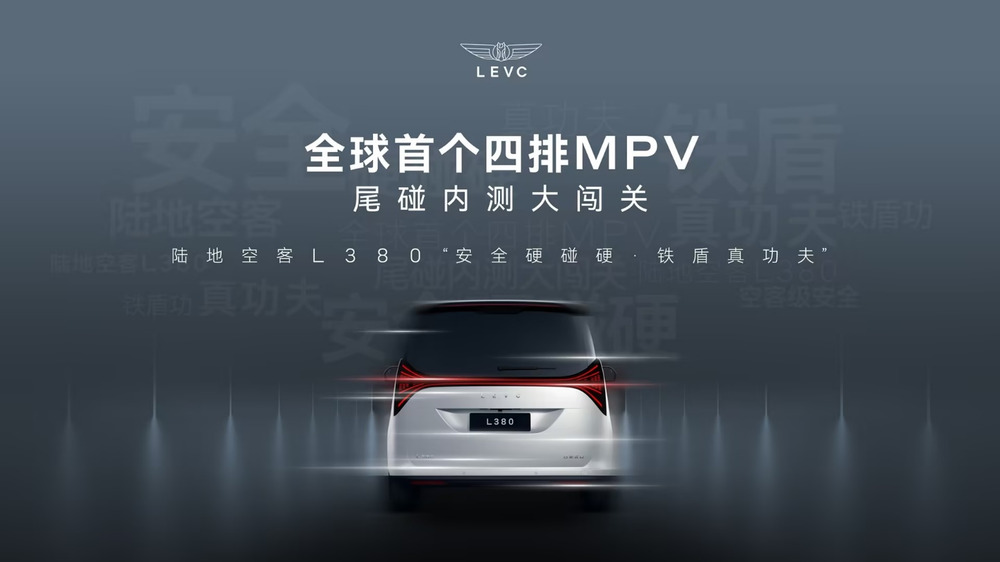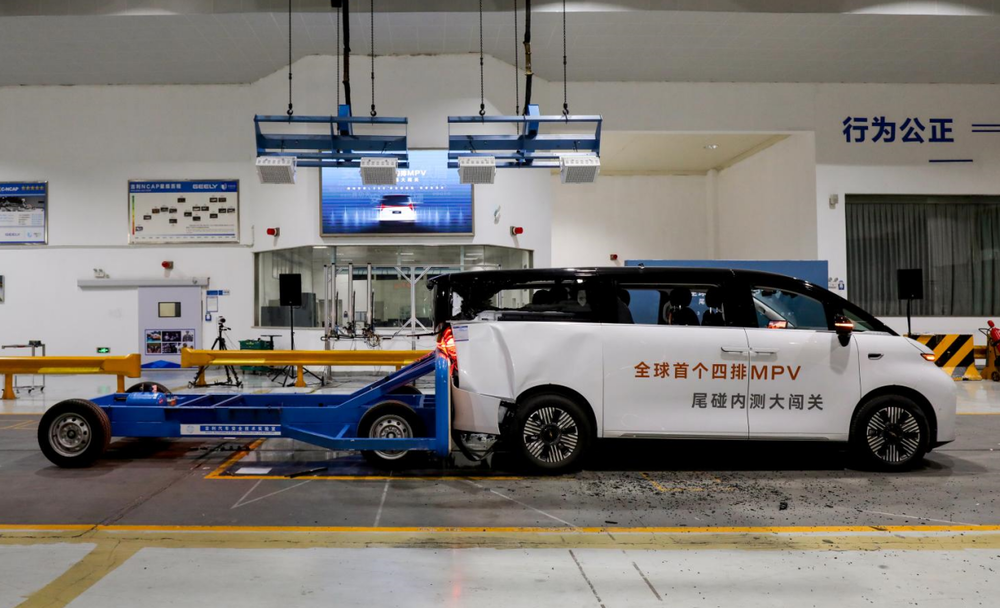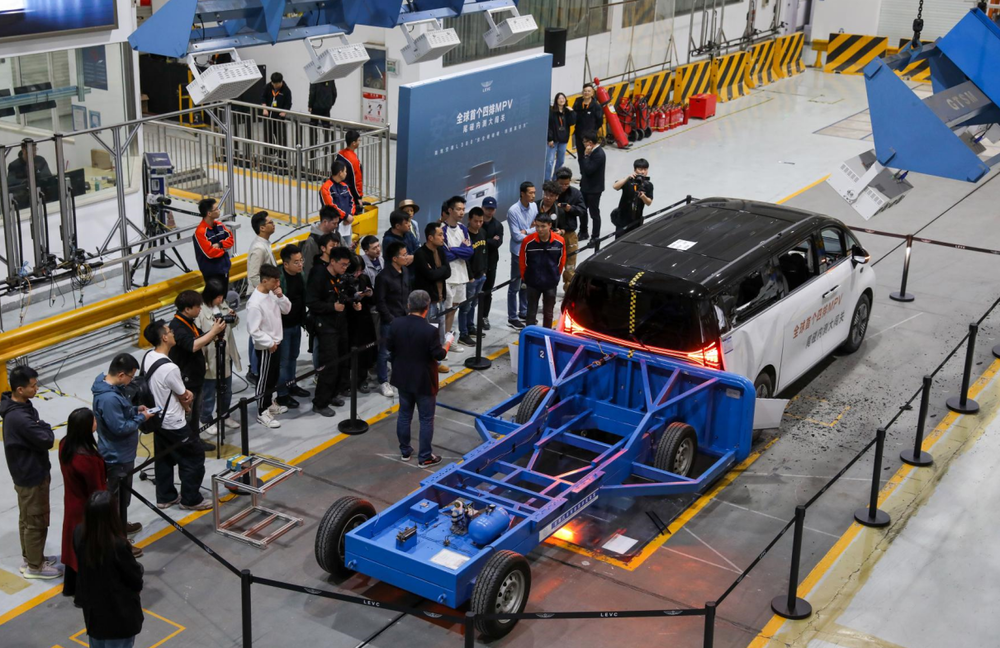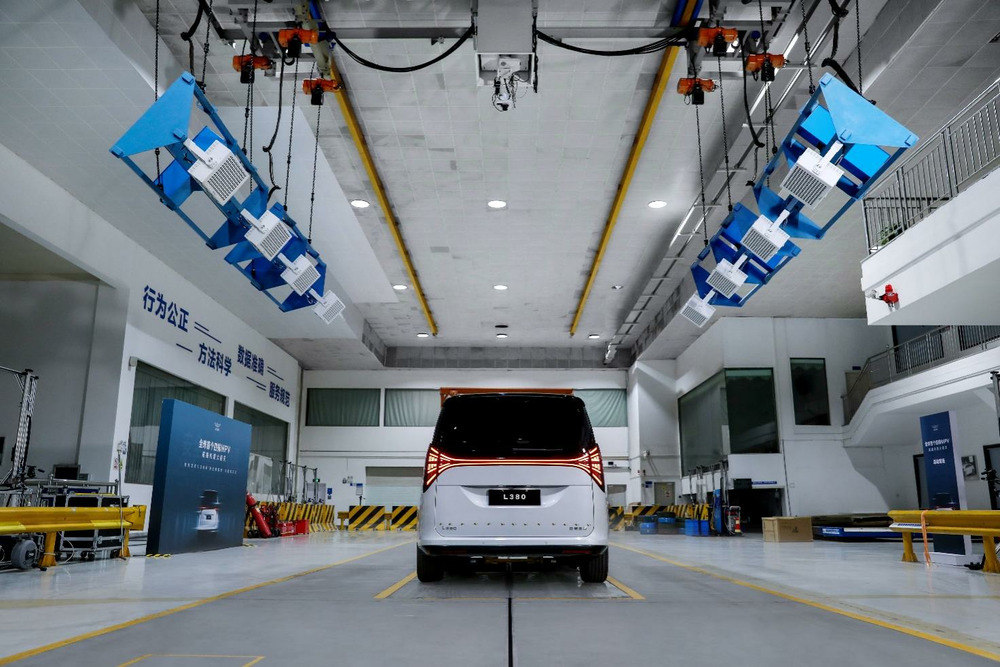 Hardware Tutorial
Hardware Tutorial
 Hardware News
Hardware News
 Geely L380 sets a precedent, showing its 'iron shield skill' in a rear-end collision test with four rows of seats
Geely L380 sets a precedent, showing its 'iron shield skill' in a rear-end collision test with four rows of seats
Geely L380 sets a precedent, showing its 'iron shield skill' in a rear-end collision test with four rows of seats
With the rapid development of the automobile industry, the need to ensure the safety of passengers has become increasingly prominent. Frontal collisions and rear-end collisions have become the most important types of accidents that threaten road traffic safety, accounting for 72% of accidents. Based on this, Geely Automobile has decided to test the safety of the vehicle through rigorous front and rear impact tests before the world's first four-row pure electric high-end MPV, LEVC L380, is launched to effectively protect users' travel safety.
On January 9, the L380, known as the "Land Airbus", completed a public frontal collision test. All 31 inspections passed the comprehensive verification of passive safety and electrical safety capabilities, becoming the industry leader. The first pure electric MPV model to complete public frontal crash testing.
On April 9, the safety breakthrough of L380 continued to deepen. L380 successfully completed the rear-impact internal test challenge at the Geely Automobile Safety Technology Laboratory, passing all 20 inspection points, fully demonstrating its strong strength in rear safety. So far, the L380 has proven its industry-leading hard-core vehicle safety capabilities with "both front and rear" results. With "Airbus-level" safety standards, it has once again refreshed people's understanding of the safety performance of high-end pure electric MPVs.

The first time in the industry that four rows of seats come with dummies for rear-end collision detection
Among all types of traffic accidents, vehicle rear-end collisions are extremely common. Especially on highways, the proportion of rear-end collision accidents reaches 77.2%. Therefore, as the world's first four-row pure electric high-end MPV, the tail impact test of the L380 is of great significance to both user safety and the pure electric MPV industry.
This rear collision test uses GB 20072 as the crash test condition. The speed difference between the front and rear vehicles is 50km/h, covering almost all rear-end collision scenarios in reality. The bullet vehicle in the test condition weighs 1100kg and is non-collapseable rigidity. For the vehicle, all the energy after the collision is absorbed by the car being rear-ended; two dummies are added in the fourth row, and additional inspection contents such as electrical safety and cockpit structural safety are added. The high standard of collision design means that the L380 with a 4-row seat layout will encounter huge impact loads, which undoubtedly poses a more severe challenge to its structural stability and energy absorption capabilities.
Judging from the results of the internal test, the L380 crash performed well and passed all 20 real-time inspection items. During the test, the L380 tail quickly collapsed and deformed, fully absorbing the energy. The entire D-pillar did not bend or deform significantly. The collapse and energy absorption process was completed in the trunk part. The passenger compartment had no obvious deformation, and the dummy maintained a good posture. And there is no contact with objects in the car. This means that in the event of a real rear-end collision, even the passengers sitting in the fourth row will be fully protected, thereby greatly reducing the possibility of injury.
During the tail impact test, the L380's double flashes were triggered normally, the door lock was unlocked normally, the door handle automatically popped up, the seat belt was tightened instantly, and the RCW function (rear collision warning function) and E-call function were triggered normally , while further enhancing vehicle safety, it also provides users with more superior escape conditions. L380 also performs well in terms of electrical safety, which is crucial for pure electric vehicles. After the collision, the L380 high voltage was powered off normally, which fully complied with the three-electric safety requirements of pure electric vehicles and further improved the safety of the entire vehicle.

Three lines of defense create the L380’s safety iron shield function
As a pure electric MPV with four rows of seats, L380’s energy absorption efficiency in structural collisions and accuracy requirements are more stringent. Relying on the active and passive safety systems, L380 has created three hard-core protection lines, creating an iron shield of safety, allowing users to drive without worries, and successfully achieved the "Airbus-level safety" standard.
L380 has hard-core supports that can withstand huge collision energy. Its rear anti-collision beam made of high-strength steel has an effective coverage width of 1450mm, accounting for 72.5% of the vehicle width ratio. The "wide-area force" can effectively resist collisions and intrusions from various angles, improving protection in all aspects; at the same time, the L380 energy-absorbing box , rear longitudinal beams, and seat pit reinforcement plates form a 2 in 2 force transmission structure, which gradient supports and absorbs most of the collision energy during rear-end collisions. The 1500MPa hot-formed steel longitudinal beams ensure zero intrusion into the core area of electrical safety; in addition, energy absorption The box and rear longitudinal beam are two-level unloaders, and the seat reinforcement plate constitutes a three-level reinforcement. "Sequential guidance" gradually resolves the collision energy to ensure that the energy is transmitted according to the designed path, while accurately controlling the collapse of the structure to prevent the upward displacement of the collapsed structure. , invading the cockpit. In addition, the head height of the four rows of L380 is 1582mm from the ground. Important parts such as the heads of the four rows of passengers are far away from the collision deformation zone. In the event of an accident, the "dislocation avoidance" high sitting position can provide additional survival space.
On top of the "hard core", L380 also has a "smart mind" - intelligent protection. The L380 uses the RCW function to intelligently warn the following vehicle to brake and maintain the brakes of the own vehicle to avoid secondary risks and reduce collision losses; in terms of emergency calls, the L380 will automatically trigger the E-call function when an unexpected collision occurs, calling for rescue in time and preempting rescue. Prime time; in addition, the important safety-related high and low voltage components of the L380 are placed between the front and rear axles, which can minimize the risk of damage in front and rear collisions. The high and low voltage components are placed in the middle to keep the "electricity" away from the collision. ; In the event of a collision, L380 cuts off the high voltage in milliseconds, while the 40Ah low-voltage lithium iron phosphate battery continues to provide power, ensuring that the vehicle is unlocked smoothly and that "power" is available.
In terms of the restraint system, the L380 seat guide rail adopts a high-strength seat slide rail adjustment design. The slide rail locking failure strength reaches 3 to 6.5 times the design standard, ensuring the stability and safety of the seat in extreme situations. safety. Even in the event of a low-probability event such as a collision during the adjustment process, the L380's seat can still remain strongly locked. Even when the four rows of seats are loaded with extreme luggage, the L380 can effectively prevent luggage from damaging the seat frame, thereby maximizing driver safety.

No safety, no luxury. The confidence behind “Airbus-level safety”
Safety is always the first standard in car manufacturing. At present, Geely has invested more than 3.6 billion yuan in safety and has 2,494 safety-related patents, ranking first in the industry. In the future, it will actively explore new safety directions supported by technological innovation in cutting-edge fields such as intelligent driving and Internet of Vehicles.
Geely also incorporates the life safety domain, health security domain, property security domain and privacy security domain into the scope of security technology development, and is committed to creating a comprehensive domain with zero casualties, zero harm to health, zero loss of property, and zero leakage of privacy. Safety, through development and verification standards that are higher than the national industry, comprehensively improve the native safety genes of Geely's new energy vehicles.
The world's first space-oriented pure electric SOA architecture not only maximizes the driving space, but also achieves multiple energy absorption and precise force dissipation through multi-dimensional safety design, which can support L380 to achieve higher performance Verify the scale to meet the design requirements of the Chinese and European five-star standards.

As the world’s first four-row pure electric high-end MPV, L380 successfully passed the rigorous front-impact and rear-impact tests, exceeding specifications, achieving safety and It has both space and space, demonstrating the high safety of the "Airbus-level" pure electric MPV, once again confirming the industry benchmark - "No safety, no luxury"!
The above is the detailed content of Geely L380 sets a precedent, showing its 'iron shield skill' in a rear-end collision test with four rows of seats. For more information, please follow other related articles on the PHP Chinese website!

Hot AI Tools

Undresser.AI Undress
AI-powered app for creating realistic nude photos

AI Clothes Remover
Online AI tool for removing clothes from photos.

Undress AI Tool
Undress images for free

Clothoff.io
AI clothes remover

AI Hentai Generator
Generate AI Hentai for free.

Hot Article

Hot Tools

Notepad++7.3.1
Easy-to-use and free code editor

SublimeText3 Chinese version
Chinese version, very easy to use

Zend Studio 13.0.1
Powerful PHP integrated development environment

Dreamweaver CS6
Visual web development tools

SublimeText3 Mac version
God-level code editing software (SublimeText3)

Hot Topics
 Geely's new pure electric car 'Xingyuan' official image released: equipped with Flyme Auto vehicle system
Sep 02, 2024 pm 01:10 PM
Geely's new pure electric car 'Xingyuan' official image released: equipped with Flyme Auto vehicle system
Sep 02, 2024 pm 01:10 PM
DoNews reported on September 2 that Geely Automobile today released the official image of its new pure electric car "Xingyuan". The car will be equipped with the FlymeAuto vehicle system and is expected to compete with BYD Dolphin and other models after its launch. The car adopts a round and lovely styling style, with smooth lines and a full and smooth overall outline. It adopts a dual-color body. Its length, width and height are 4135/1805/1570mm respectively, and the wheelbase is 2650mm. The official released the cockpit design of the new car this time. The interior of the new car also uses a large number of curves, echoing the agile appearance of the exterior. It is equipped with a suspended central control screen, a two-spoke steering wheel, and decorative panels on the doors and in front of the passenger seat. It is embellished with an outline drawing that resembles a group of urban high-rise buildings. The car will be built based on a new pure electric platform.
 Xiaomi POCO Pad 5G: Xiaomi releases new POCO tablet with affordable starting price
Aug 24, 2024 am 06:43 AM
Xiaomi POCO Pad 5G: Xiaomi releases new POCO tablet with affordable starting price
Aug 24, 2024 am 06:43 AM
Xiaomi has now released the POCO Pad 5G following the tablet's appearance on Geekbench earlier this week. Incidentally, the tablet is the second entry in the POCO Pad range after the non-cellular model (curr. $326.50 on Amazon) that arrived earlier t
 No.9 electric vehicle mechanic MMAX2 released: starting from 7999 yuan
Aug 23, 2024 am 06:59 AM
No.9 electric vehicle mechanic MMAX2 released: starting from 7999 yuan
Aug 23, 2024 am 06:59 AM
On August 22, Nine Company, my country's leading smart two-wheeled electric vehicle company, released three series of multiple new two-wheeled electric vehicle products at once, including both new product series and upgraded products of existing series. The many new products released by No.9 Company this time have been almost fully upgraded to "top-of-the-line" products from configuration, design to intelligence. In addition to iterative upgrades on the product side, Nine Company has also made a lot of layout and optimization in the whole sales process services. In addition to increasing offline pure after-sales outlets, Nine Company will also build a national rapid energy replenishment network. In recent years, my country's two-wheeled electric vehicle market has reached a stage of high-quality development, and consumer demand for two-wheeled electric vehicles has become diversified and "high-end." Correspondingly, on the supply side, the competition between brands has also transitioned from the previous pure "volume price" to
 Realme launches 320W super-light speed second charge
Aug 14, 2024 pm 06:46 PM
Realme launches 320W super-light speed second charge
Aug 14, 2024 pm 06:46 PM
On August 14, the Realme mobile phone made the world's first flash charging black technology - 320W super-light speed charging, marking another revolutionary leap in mobile phone flash charging speed, and China's technology once again leads the world! Realme's 320W super-light speed charging has achieved unprecedented breakthroughs in terms of power, safety and efficiency. It not only pushes the industry's flash charging technology to a new height, but also brings a new flash charging experience to users. 320W super-light speed second charging, a miraculous experience of 4 minutes and 30 seconds. 320W super-light speed second charging technology breaks the limit of charging speed again. It only takes 4 and a half minutes to charge a 4420mAh mobile phone battery to 100%, which is faster than the previous 240W. Flash charging technology once again improves charging efficiency. Behind this achievement is actually the combination of "high power, high safety and miniaturization"
 Global terminal sales of SAIC Passenger Vehicles exceeded 477,000 units from January to July, a year-on-year increase of over 12%
Aug 12, 2024 pm 06:42 PM
Global terminal sales of SAIC Passenger Vehicles exceeded 477,000 units from January to July, a year-on-year increase of over 12%
Aug 12, 2024 pm 06:42 PM
In July 2024, global terminal sales of SAIC's dual-brand passenger cars exceeded 59,000 units; from January to July, global cumulative terminal sales exceeded 477,000 units, a year-on-year increase of more than 12%. The industry's highest "Super Safety Commitment" pays one for every burn, and the lifetime warranty of three electric vehicles follows the car but not others. With a deep insight into the pulse of the market and an accurate grasp of consumer needs, on July 4, SAIC Passenger Cars officially launched the industry's highest The standard "Super Safe Core Commitment" sets a new industry benchmark for battery zero-combustion guarantee with a service standard of paying new cars within 20 working days. At the same time, it is announced that the lifetime warranty of three electric vehicles is not limited to the first car owner and annual driving mileage, providing users with Provides comprehensive security and worry-free experience. This move goes beyond the current warranty standards of mainstream car companies and bids farewell to the 30,000-kilometer warranty commonly used in the industry.
 Hongmeng Zhixing Wenjie's new M7 Pro was officially released, and its first coupe SUV, Zhijie R7, was unveiled on the same stage
Sep 02, 2024 pm 01:40 PM
Hongmeng Zhixing Wenjie's new M7 Pro was officially released, and its first coupe SUV, Zhijie R7, was unveiled on the same stage
Sep 02, 2024 pm 01:40 PM
On August 26, Hongmeng held its first new product launch conference. Wenjie’s new M7 Pro was officially launched, with an official price of 249,800-289,800 yuan. At the same time, Hongmeng Zhixing’s first coupe SUV, the Zhijie R7, was officially unveiled. Yu Chengdong, Huawei’s Managing Director, Chairman of Terminal BG, and Chairman of Smart Car Solutions BU, said: “Wenjie’s new M7 Pro has the largest space, the best driving control, the strongest intelligent driving and the strongest safety in its class. It is the best in the 250,000 class. "SUV!" will bring users a more extreme travel experience and help Hongmeng Zhixing continue to increase sales." At the press conference, Hongmeng Zhixing handed over the latest answer: AITO Wenjie delivered 400,000 vehicles in 2 years and 5 months, creating a smart luxury brand. New record. Gaoyan’s urban performance SUV Wenjie’s new M5 has been delivered with over 20,000 deliveries
 Wenjie's new M7 Pro is officially launched with prices starting at NT$249,800, equipped with the basic version of HUAWEI ADS
Sep 02, 2024 pm 12:34 PM
Wenjie's new M7 Pro is officially launched with prices starting at NT$249,800, equipped with the basic version of HUAWEI ADS
Sep 02, 2024 pm 12:34 PM
On August 26, Hongmeng Smart held a new product launch conference. Its three major brands, AITO, LUXEED and STELATO, were unveiled with a number of blockbuster new cars. At the press conference, Wenjie's new M7 Pro was officially launched, priced at 249,800-289,800 yuan. It is equipped with the HUAWEIADS basic version of the intelligent driving assistance system, ushering in a new era of intelligent driving for all. Yu Chengdong, Huawei’s Managing Director, Chairman of Terminal BG, and Chairman of Smart Car Solutions BU, said: “Wenjie’s new M7 Pro has the largest space, the best driving control, the strongest intelligent driving and the strongest safety in its class. It is the best in the 250,000 class. SUV! will bring users a more extreme travel experience and help the sales of Hongmeng Zhixing family continue to increase. "Extraordinary space, ever-changing magic comfortable seats."
 SAIC-Volkswagen's new SUV unveiled, Tuyue Xinrui sets new benchmark for A-class SUVs
Aug 21, 2024 pm 08:46 PM
SAIC-Volkswagen's new SUV unveiled, Tuyue Xinrui sets new benchmark for A-class SUVs
Aug 21, 2024 pm 08:46 PM
Recently, SAIC Volkswagen’s new SUV TharuXR was unveiled. The new car is positioned as an A-class SUV, and its Chinese name is Tuyue Xinrui. As a new warrior of the Tuyue family, it will join forces with the new Tuyue to accelerate its lead in the A-class SUV market with new development momentum. Since the announcement of the Ministry of Industry and Information Technology’s declaration in June, Tuyue Xinrui has attracted widespread attention with its new-generation Volkswagen SUV design language and its class-leading, powerful and fuel-efficient 1.5TEVOII net-efficiency engine. This debut, along with the release of more model information, creates a new realm of fuel economy and durability, surprising the first batch of KOLs who experienced it. A KOL said: "The Tuyue Xinrui may be the most worth buying A-class SUV, and I am very much looking forward to its launch." You won’t get tired of the appearance for a long time. Tuyue’s cutting-edge appearance adopts Volkswagen’s new generation SU





